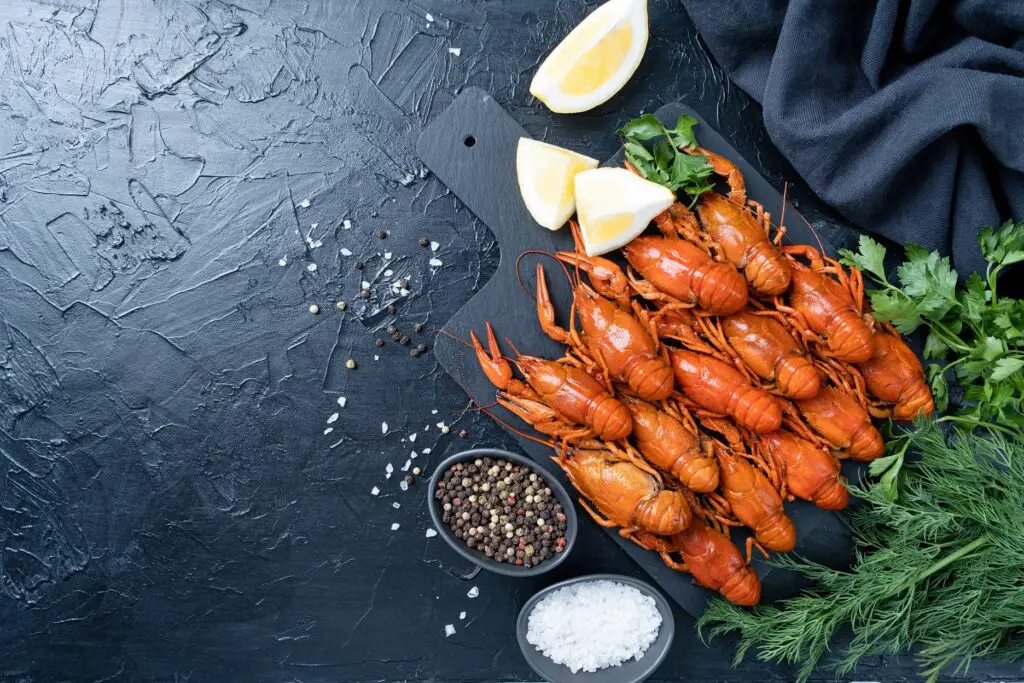Nutritional Value of Crawfish
Crawfish, also known as crayfish or freshwater lobsters, are small crustaceans that pack a punch in terms of nutritional value. They are an excellent source of high-quality protein, which is crucial for the growth and repair of tissues in both the mother and the developing baby. Crawfish are low in fat, making them a lean protein option. They are rich in essential nutrients such as vitamins B12 and B6, which play a significant role in maintaining healthy nerve function and red blood cell formation. Additionally, crawfish are an excellent source of iron, which helps prevent anemia and supports increased blood volume during pregnancy. They also provide zinc and magnesium, which are vital for immune function, DNA synthesis, and muscle and nerve function. These nutrients collectively support the overall health and development of both the mother and the baby during pregnancy.
Risks Associated with Eating Crawfish During Pregnancy
While crawfish offer numerous health benefits, there are also potential risks associated with consuming them during pregnancy. One concern is the potential presence of contaminants such as mercury and bacteria, which can pose risks to the developing fetus. Mercury exposure, even in small amounts, can adversely affect the baby’s neurological development, leading to cognitive and motor deficits. Additionally, improperly cooked or contaminated crawfish can harbor harmful bacteria like Listeria or Salmonella, which can lead to severe infections and complications in pregnancy. Pregnant women are often advised to be cautious about consuming seafood that may contain high levels of mercury or be susceptible to bacterial contamination to ensure the safety and well-being of their baby.
Benefits of Eating Crawfish During Pregnancy

Guidelines for Safe Consumption
To minimize potential risks, pregnant women should follow certain guidelines when consuming crawfish. It’s crucial to ensure that the crawfish are sourced from reputable suppliers to avoid contamination with harmful substances. When preparing crawfish at home, make sure they are cooked thoroughly to an internal temperature of at least 145°F (63°C) to kill any bacteria or parasites that may be present. It’s also important to practice proper food handling and hygiene, such as washing hands and utensils thoroughly before and after handling raw crawfish. Avoiding excessive consumption and opting for smaller portions can further reduce any potential risks. Limiting intake to a few servings per month can help manage exposure to any contaminants while still allowing you to enjoy the nutritional benefits of crawfish.
Alternative Seafood Options
Expert Opinions and Studies
Experts recommend that pregnant women consume a variety of seafood as part of a balanced diet, but they should be mindful of potential contaminants and opt for low-mercury options. Studies have shown that moderate seafood consumption during pregnancy can have positive effects on fetal development and may even lower the risk of certain complications.
Common Myths and Misconceptions
There are several myths and misconceptions surrounding the consumption of seafood during pregnancy, including the belief that all seafood should be avoided altogether. While certain types of seafood should be consumed in moderation due to their mercury content, many varieties are safe and beneficial when included as part of a healthy diet.
Personal Experiences
Many pregnant women may have personal experiences with eating crawfish during pregnancy. Some may have enjoyed them without any issues, while others may have chosen to avoid them altogether due to concerns about potential risks. Personal anecdotes can provide valuable insights but should not replace professional medical advice.
Tips for Cooking Crawfish Safely
For those who enjoy crawfish and wish to include them in their diet during pregnancy, there are several tips for cooking them safely. Ensure that crawfish are thoroughly cooked to an internal temperature of at least 145°F to kill any harmful bacteria. Avoid consuming raw or undercooked crawfish, and practice proper food handling and hygiene to prevent contamination.
Sustainable Sourcing and Environmental Impact of Crawfish
When considering the inclusion of crawfish in your pregnancy diet, it’s also important to think about the environmental impact and sustainability of your food choices. Crawfish farming, especially in areas like Louisiana, is often managed sustainably, supporting local ecosystems and economies. Choosing crawfish from sustainable sources helps protect aquatic environments and ensures the long-term availability of this nutritious seafood. When purchasing crawfish, look for certifications or labels that indicate sustainable practices, such as those from the Marine Stewardship Council (MSC). This way, you can enjoy the health benefits of crawfish while contributing to environmental conservation.
Cooking Techniques to Maximize Nutrient Retention in Crawfish
Proper cooking techniques can help maximize the nutrient retention in crawfish, ensuring that you get the most out of this nutritious seafood. Steaming or boiling crawfish in a minimal amount of water can help preserve essential vitamins and minerals that might otherwise be lost through prolonged cooking methods. Adding vegetables and herbs to the cooking water can infuse additional nutrients and flavors into the crawfish. Additionally, avoiding overcooking is crucial as it can lead to nutrient degradation. By using gentle and quick cooking methods, you can maintain the nutritional integrity of crawfish while enjoying a delicious meal.
Combining Crawfish with Other Nutrient-Dense Foods
To create a balanced and nutrient-rich meal, consider combining crawfish with other nutrient-dense foods. Pairing crawfish with whole grains like quinoa, brown rice, or barley can provide additional fiber and essential nutrients like B vitamins and magnesium. Adding a variety of colorful vegetables, such as bell peppers, spinach, and tomatoes, enhances the meal’s overall nutrient profile by contributing vitamins, minerals, and antioxidants. This combination not only creates a delicious and satisfying dish but also supports the nutritional needs of both the mother and the developing baby during pregnancy.
Cultural Significance and Culinary Traditions Involving Crawfish
Crawfish hold significant cultural and culinary importance in various regions, particularly in the southern United States and parts of Europe. Understanding and appreciating these traditions can add a meaningful dimension to your dietary choices during pregnancy. For example, participating in a traditional crawfish boil can be a social and enjoyable way to consume this seafood, provided that proper food safety measures are followed. Exploring different cultural recipes and cooking methods can also offer diverse and flavorful ways to include crawfish in your pregnancy diet, making meals both nutritious and culturally enriching.
Managing Food Cravings and Aversions During Pregnancy
Pregnancy often comes with food cravings and aversions, and managing these while maintaining a nutritious diet can be challenging. If you find yourself craving crawfish, it’s possible to enjoy it safely by following the recommended guidelines for sourcing and cooking. On the other hand, if you experience an aversion to crawfish or any other seafood, it’s important to listen to your body and seek alternative sources of similar nutrients. Consulting with a healthcare provider or a nutritionist can help you identify suitable substitutes and ensure that you continue to meet your nutritional needs throughout your pregnancy.
Understanding the Role of Omega-3 Fatty Acids in Pregnancy
Omega-3 fatty acids, particularly DHA (docosahexaenoic acid) and EPA (eicosapentaenoic acid), are crucial for fetal brain and eye development. While crawfish contain lower levels of omega-3s compared to fatty fish like salmon, they still contribute to the overall intake of these essential fats. Pregnant women should aim to include a variety of omega-3-rich foods in their diet, such as flaxseeds, chia seeds, walnuts, and fortified foods, alongside seafood options. This balanced approach helps ensure adequate intake of omega-3s, supporting optimal fetal development and maternal health.
Incorporating Crawfish into a Balanced Pregnancy Diet
A balanced pregnancy diet includes a variety of foods that provide essential nutrients for both the mother and the developing baby. Crawfish can be a part of this balanced diet when consumed in moderation and prepared safely. Combining crawfish with other protein sources, whole grains, fruits, and vegetables can create well-rounded meals that offer diverse nutrients. Planning meals that incorporate different food groups ensures that you receive a comprehensive array of vitamins, minerals, and macronutrients necessary for a healthy pregnancy.
Conclusion
In conclusion, the question of whether you can eat crawfish while pregnant is a nuanced one. While crawfish offer numerous nutritional benefits, pregnant women should exercise caution and follow guidelines to minimize any potential risks. Consulting with a healthcare provider and making informed dietary choices can help ensure a healthy pregnancy for both mother and baby.
FAQs
-
Is it safe to eat crawfish during the first trimester of pregnancy?
- While it’s generally safe to consume crawfish during pregnancy, it’s advisable to consult with a healthcare provider, especially during the first trimester when fetal development is critical.
-
Are there any specific concerns about eating boiled crawfish while pregnant?
- Boiled crawfish can be safe to eat during pregnancy if cooked thoroughly and sourced from reputable suppliers. However, pregnant women should be cautious about potential contamination and opt for smaller portions.
-
Can eating crawfish during pregnancy cause allergies in the baby?
- While allergies to seafood are possible, they are relatively rare. If there is a family history of seafood allergies or other allergic conditions, it’s advisable to consult with a healthcare provider before consuming crawfish or other seafood during pregnancy.
-
How often can I safely eat crawfish while pregnant?
- Moderation is key when consuming crawfish or any seafood during pregnancy. It’s recommended to vary the types of seafood consumed and limit intake to 2-3 servings per week to minimize exposure to potential contaminants.
-
Are there any additional precautions I should take when eating crawfish from a restaurant while pregnant?
- When dining out, pregnant women should ensure that the restaurant follows proper food safety practices and inquire about the sourcing and preparation of the crawfish dish. If there are any doubts or concerns, it’s best to choose an alternative option or prepare crawfish at home using safe cooking methods.


1 thought on “Can You Eat Crawfish While Pregnant ?”